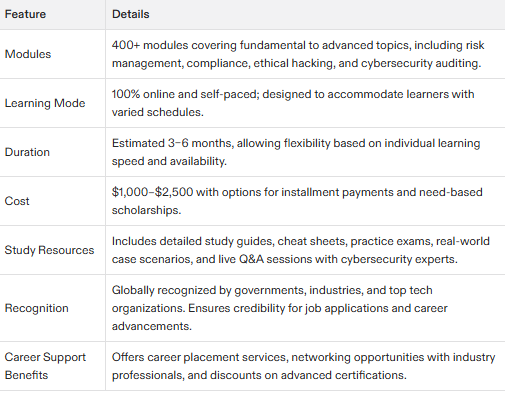Table of Contents
- What Is a Basic Cybersecurity Certification?
- Why Should You Earn a Basic Cybersecurity Certification?
- What to Look for in Basic Cybersecurity Certifications
- Recommended Certification Programs
- How to Prepare for Your Basic Cybersecurity Certification
- Career Opportunities with Basic Cybersecurity Certification
- Informative Table - ACSMI Certification Program Overview
- FAQ on Basic Cybersecurity Certification
Cybersecurity is no longer a niche field—it's a global necessity. With cyberattacks growing more sophisticated every day, organizations are looking for skilled professionals to fortify their defenses. If you're an aspiring cybersecurity expert or simply want to understand the fundamentals, obtaining a basic cybersecurity certification is your first and most important step.
What Is a Basic Cybersecurity Certification?
A basic cybersecurity certification verifies your foundational knowledge in key security principles and practices. This type of certification is geared toward beginners and focuses on essential skills like identifying vulnerabilities, preventing breaches, and understanding cybersecurity frameworks. By earning a certification, you demonstrate that you've mastered the basics, which could open the door to entry-level cybersecurity roles or further advanced training. Most certifications, like the ACSMI certification, align their content with current industry needs, ensuring you're learning relevant skills.
Why Should You Earn a Basic Cybersecurity Certification?
There are plenty of reasons why starting with a basic certification is the right move, especially in 2025.
Jumpstart Your Career
Cybersecurity is one of the fastest-growing industries. The U.S. Bureau of Labor Statistics projects a 35% growth rate for cybersecurity jobs by 2031. A basic cybersecurity certification can make your resume stand out to potential employers.Learn Practical Skills
Certifications focus on actionable knowledge, not just theory. You'll learn how to spot threats, mitigate risks, and leverage tools to secure systems—skills that you’ll use immediately in the workplace.Pathway to Advanced Certifications
Many cybersecurity professionals start with basic certifications before moving to more advanced credentials. It’s the logical first step in building your expertise.Higher Earnings
Even at entry level, certified professionals can earn significantly more compared to non-certified peers. Certifications show you take your career seriously.
What to Look for in Basic Cybersecurity Certifications
When evaluating certifications, look for these must-have features:
- Comprehensive Curriculum: Does it cover key topics like firewalls, intrusion detection, and compliance?
- Flexible Learning Modes: Many programs are self-paced and online, making it easy to study alongside work.
- Industry Recognition: Choose globally recognized certifications like ACSMI to ensure credibility.
- Prep Resources: Look for programs with mock exams, practice questions, and detailed guides.
Recommended Certification Programs
One standout choice is the ACSMI certification. This program not only provides a strong foundation but dives deep into advanced concepts later in the curriculum, making it perfect for beginners and those planning to grow in the field.
How to Prepare for Your Basic Cybersecurity Certification
Earning your basic cybersecurity certification requires focus and strategy. Here are three preparation tips to ensure success.
Create a Study Plan
Divide the syllabus into manageable chunks. Focus on mastering one topic at a time, like network security or vulnerability assessment.Leverage Online Resources
Many programs, including ACSMI, offer rich resources like webinars, cheat sheets, and live Q&A sessions to reinforce learning. Take full advantage.Practice, Practice, Practice
Make use of mock exams and scenario-based exercises to sharpen your skills and identify weak areas.
Career Opportunities with Basic Cybersecurity Certification
After obtaining your certification, you’ll qualify for roles like Security Analyst, IT Technician, or Network Administrator. Many of these roles also serve as stepping stones to more senior positions like Penetration Tester or Security Architect.
The ACSMI Certification Experience: A Gateway to Cybersecurity Mastery and Career Success
Here's something intriguing about the ACSMI certification program: It's not just about the extensive 400+ modules that cover everything from basic cybersecurity principles to advanced topics like ethical hacking and compliance auditing. What truly sets this program apart is its holistic approach to learning and career development. Imagine being part of a learning journey where you have access to a wealth of resources designed to cater to different learning styles. The program offers detailed study guides and cheat sheets for quick reference, practice exams to simulate real-world scenarios, and even live Q&A sessions with cybersecurity experts. These sessions are a goldmine for learners, providing the opportunity to ask questions and gain insights from professionals who are actively shaping the cybersecurity landscape. Moreover, the ACSMI certification is globally recognized, which means that once you complete it, your credentials are respected and valued across industries worldwide. This opens doors to a plethora of job opportunities, from government positions to roles in top tech companies. But it doesn't stop there. The program also offers robust career support, including networking opportunities with industry professionals and career placement services. This means that not only do you gain the knowledge and skills needed to excel in cybersecurity, but you also receive the support to transition smoothly into the workforce. In essence, the ACSMI certification is more than just a learning program; it's a comprehensive career-building experience that equips you with the tools, knowledge, and connections to thrive in the ever-evolving field of cybersecurity. If you're ready to embark on a journey that combines learning with real-world application and career advancement, this certification might just be the perfect fit for you!
Informative Table - ACSMI Certification Program Overview
FAQ on Basic Cybersecurity Certification
Q1. How long does it take to earn a basic cybersecurity certification?
Most programs can be completed in 3–6 months, depending on your learning speed.
Q2. Are basic cybersecurity certifications expensive?
Costs vary, but certifications typically range from $500 to $2,500. Some programs, like ACSMI, even offer installment plans or scholarships.
Q3. Do I need prior experience to get certified?
No prior experience is required for most basic cybersecurity certifications. They are designed for beginners.
Q4. Which certification is best for career advancement?
While there are several great options, the ACSMI certification stands out for its comprehensive 400+ module curriculum and global recognition.
Q5. Is a basic certification enough for a cybersecurity career?
It’s an excellent first step, but advancing to intermediate and expert certifications will help you unlock higher-level roles and salaries.
Final Thoughts
Starting with a basic cybersecurity certification is one of the smartest moves in today’s career landscape. Choose an industry-recognized program like ACSMI to gain practical skills, open new career doors, and establish a solid foundation in cybersecurity. Equipped with the right certification, you’re ready to tackle modern cyber threats and build a rewarding career in the field.





